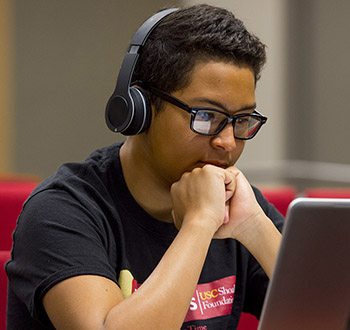
Andres Ruiz and Francesca Hill
They started in October – making the trip to USC Shoah Foundation’s home at USC’s Leavey Library once a month, every month to meet, either virtually or physically, and study what attitudes breed hatred and intolerance, how they can spread positive moral authority and how to use the weight of testimony from the Visual History Archive to become active participants in civil society.
They are students – USC Shoah Foundation’s newest ensemble of Junior Interns, comprised of grade-schoolers ranging from seventh to twelfth grade all picked for their interest in working with USC Shoah Foundation fellows and with the Institute’s Visual History Archive and IWitness activities.
While previous profiles have focused on the older Junior Interns, the youngest are not to be overlooked. Students like Andres Ruiz and Francesca Hill, freshmen from Lynwood, Calif. and Chicago, respectively, have the same drive as their college-entering counterparts, to bring home from the program a new outlook of the world that they can share with their communities.
“The reason I wanted to be a Junior Intern was to improve my skills in being social, like presenting and learning to work in a group,” Ruiz said. “But also, I was interested in learning how to help stop hatred in my school.”
This is one focus of the program. The Junior Interns, some of whom commute virtually to the Institute each month, are expected to use Visual History Archive testimonies to take home lessons about what connects people as human beings, and what can cause the disconnects that can lead to hatred, violence and possible genocide. They also learn, for example, about the different types of memory – personal, collective and cultural – that lend themselves to remembering genocide events, as well as cultivate skills for navigating digital media and media literacy.
“At the meetings, we look at IWitness videos of survivors of acts of hatred, like the Holocaust, and learn how to prevent building stereotypes into higher levels of the ‘pyramid of hate,’” Ruiz said. “During my experience as an Intern, I have learned a lot about how to counter hate and prevent it.”
Ruiz and fellow Junior Intern Hill attribute what they’ve learned to the activities put out by USC Shoah Foundation’s Education Department, and to the valuable testimonies found in the Visual History Archive.
“At meetings, we watch testimonies, analyze them and then discuss them, converse about our opinions on world topics and about the pyramid of hate and why it happens,” Hill said. “We’ve learned about the stories of many genocide survivors, as well as aid workers and bystanders. The testimonies have affected me greatly because I can see and hear real-life stories from the people who experienced them. This motivates me to put a stop to injustice even more, because of the emotion the speaker conveys.”
Ruiz shares a similar sentiment, and hopes to use what he’s learned through the program to make a positive impact on his community.
“Testimony has changed the way I look at people,” Ruiz said. “Now I look at people with many stories, not just one. This program will help me contribute to small problems in our community and hopefully also help others realize that there’s more than one story to everyone.”
With just a few months remaining in their programming, the Junior Interns will continue to have the opportunity to visit, either physically or virtually, museums and authentic sites, and contribute to the work of the Institute through their own research. Interns like Ruiz and Hill will continue to craft and deliver presentations on what they’ve learned so far, interact in some capacity with Institute staff and continue to work with people of diverse backgrounds and cultures, putting to use the interpersonal skills they will have been taught throughout the program.
While Ruiz hopes to study aerospace engineering and bring change to the world through a scientific lens, Hill hopes to make a difference by studying history, sociology or writing in college.
“This program has helped me think harder about certain topics and become aware of what actually happens in our world every day,” Hill said. “In the future, I can take what I learned to do the right thing and search for ways to make a difference.”
Upon completion of the internship, all of the Interns will receive a certificate and community service hours, as well the option to continue engaging with the Institute as program assistants or Student Ambassadors.
To keep up with Junior Interns like Hill and Ruiz, follow the hashtag #IWitnessJrIntern.